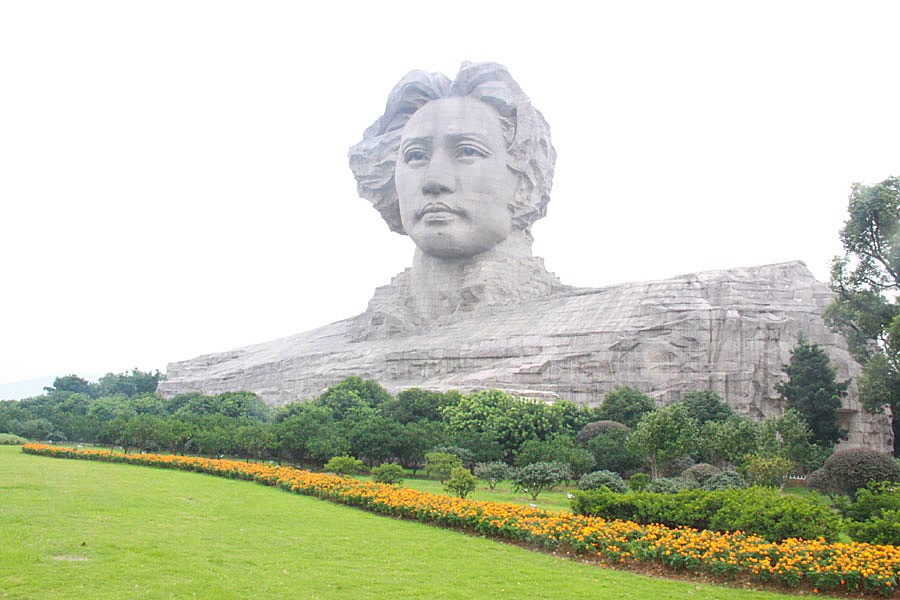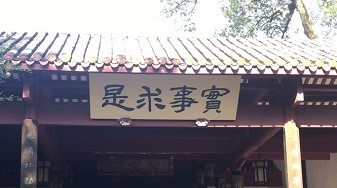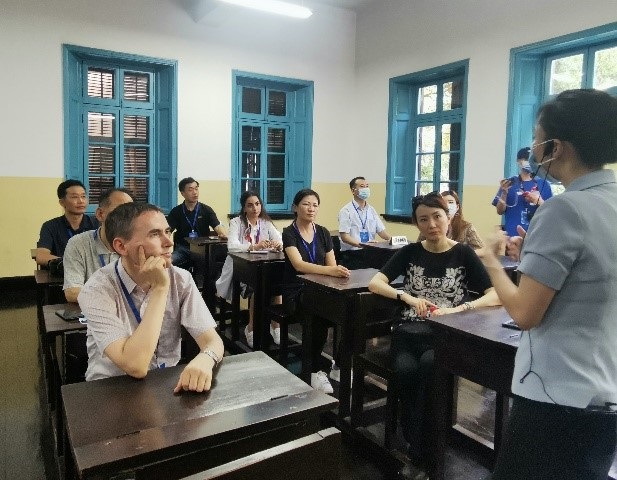In the beautiful autumn season, I joined a group of journalists to visit Hunan Province in central China. The first of our three stops was in Changsha, the provincial capital. The places we visited set a foundation for understanding Hunan’s history and extraordinary achievements, and they shared two common links, youthful vitality and education.

On Orange Isle, a statue depicts a young Mao Zedong in his prime in 1925 when he wrote the famous poem Spring in a Pleasure Garden — Changsha. [Photo/ CRIENGLISH.com]
Orange Isle, located in the center of Xiangjiang River in Changsha City, is the biggest inland island in China. Its name is derived from the many orange trees that grow there. The history of Orange Isle can be traced back to 305 A.D. In 1925, Mao Zedong, then a young man of 32, wrote a famous poem about Changsha in which he described the beautiful natural environment of the island. Titled Spring in a Pleasure Garden — Changsha, the poem expressed then Mao’s aspiration to build a new country. In honor of the poem, a massive statue of the youthful Mao made of reinforced concrete with a granite surface was erected and is now a major feature on the island. It is designed to send a positive image to the young generation in China. Standing in front of the sculpture or merely walking past it, one is impressed with the look of vigor, thoughtfulness, and mission in the statue’s eyes.
But what was it that influenced Mao’s thinking? That takes us to our next stop, Yuelu Academy. The Yuelu Academy (also as known as the Yuelu Academy of Classical Learning or Yuelu Shuyuan in Chinese) is located on the east side of Yuelu Mountain in Changsha, on the west bank of the Xiangjiang River. Local historians trace the history of this academy back more than a thousand years. As one of the four most prestigious academies in China standing for over 1,000 years, this academy has been a famous institution of higher learning, as well as a center of academic and cultural activities since it was formally set up during the Northern Song dynasty back in 976. It was later converted into the Hunan Institute of Higher Learning in 1903 and then later renamed Hunan University in 1926.
Walking around the grounds of the school, I was impressed with the importance the ancient people of Hunan placed on young people’s education. For them, education was not just merely teaching students knowledge, but also training them to be useful to society. Wooden placards, placed above various entrances or on the wall, depicted the high moral aspirations of true education that the school strove to achieve in training people who can benefit society.

This saying “seeking truth from facts” hanging at the Yuelu Academy inspires countless Chinese people.
The saying hanging inside the academy, Shi Shi Qiu Shi (实事求是) which means “seeking truth from facts,” specifically inspired Mao when he lived at the academy during the years of 1916-1919. His understanding of this truth later helped him in his search to combine the basic principles of Marxism with China’s reality. When President Xi Jinping inspected the Yuelu Academy on September 17, 2020, he also emphasized the motto of Shi Shi Qiu Shi and pointed out that education needs to combine academics with practical teaching.
The final stop of our morning tour in Changsha was Mao Zedong’s alma mater — Hunan First Normal College. Mao lived, studied, and worked here during his youth. The Young Mao Zedong Memorial Hall presents the scenes of those years. Walking through the halls of the school, the passion for learning and teaching which inspired young Mao can still be felt today. In 1950, when commenting about his education, Mao said, “Even though I have not attended university or studied abroad, the foundation of all my knowledge and learning was laid at the Hunan First Normal College… that is a good school.”

We are sitting in a classroom that Chairman Mao once studied in, listening to stories about his life as a student.
It’s learned that the goal of the college today is to equip students with skills in art, music, and literature, and inspire in them a spirit of responsibility for education and their country and send them back to serve their home city, town, or villages.
After a morning spent visiting such places of rich culture, innovative education, and inspiring ideas, I have a deeper understanding of why Hunan people have made great contributions to the development of China.